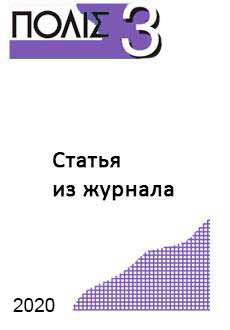Online shop of "Polis. Political Studies" Journal
We in the world, the world in us
Sungurov A.Yu., Kozlova N.N., Mamagulashvili D.I. Public Chambers as Institutions for Implementing the Paternalistic Model of Interaction Between Authority and Society: Experience of the Tver Region and St. Petersburg. – Polis. Political Studies. 2020. No. 3. P. 93-109. (In Russ.).
Free!
The article analyzes the logic of transforming public chambers from the point of view of: a) the principles of organization and selection of staff, b) the functionality laid down in the regulatory framework, c) the measures taken reflecting the content and focus of the work, d) the information policy, e) building relationships with public organizations, state authorities and local self-government, and f) the influence on the socio-political situation in the region. The main research methods used were an analysis of the regulatory framework, content from the Public Chamber of the Tver Region and St. Petersburg, and semi-structured interviews with chamber members, experts, government officials and deputies of regional parliaments with experience in interacting with public chambers. An analysis of the principles of organization and the functionality of public chambers shows that the potential for their influence on public policy in the law is limited. The authors highlight the general and specific features of the evolution of the public chambers of the Tver region and St. Petersburg. If the Public Chamber of the Tver Region was initially created as a real institute of regional policy, with the levers of influence prescribed in law on the process of making power decisions (the right of legislative initiative, the possibility of sending representatives to the qualification collegium of judges), the Public Chamber of St. Petersburg was created as a kind of elite club under the governor with which the governor could consult if desired. General changes regarding public chambers are moving towards adjusting the principles of their recruitment, numerical strength, the study of individual powers, and the unification of the system of regional public chambers. An analysis of the activities of the public chambers allows the authors to conclude that they correlate with changes in the domestic policy of the Russian Federation. According to the authors, this public-state institution contributes to the activation of those social forces that are ready to integrate into communication to promote socially oriented projects. The authors believe that the genesis and evolution of public chambers in Russia throughout the 2000s indicates a change in the mechanisms of interaction between civil society structures and the state, as well as the design of a paternalistic model of mediation of power and society.
 English
English Русский
Русский

Reviews
There are no reviews yet.